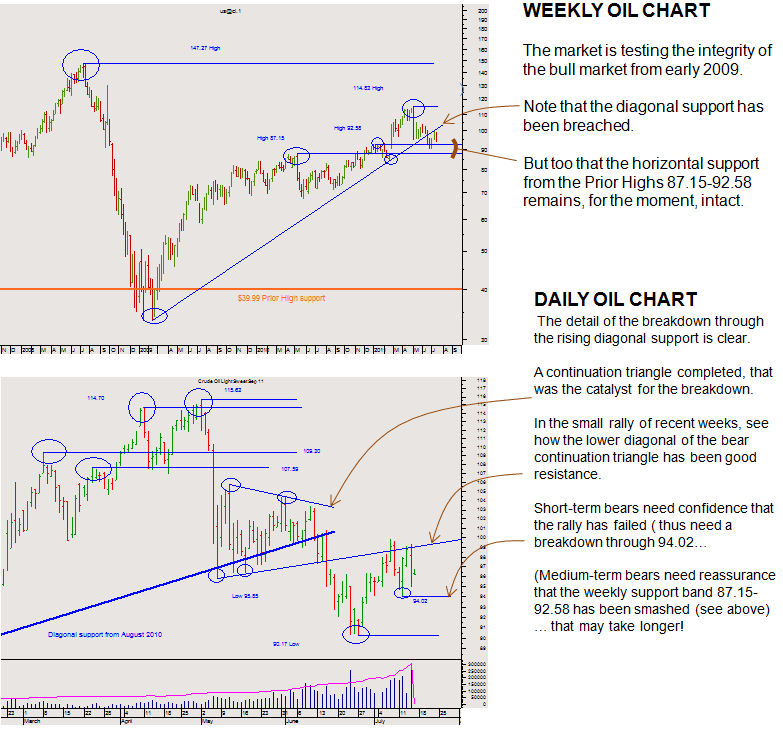Crude Oil Price Uncertainties
Commodities / Crude Oil Jul 15, 2011 - 06:13 AM GMTBy: Seven_Days_Ahead
 The Euro zone sovereign debt crisis had barely been quietened by Greece agreeing to the austerity terms of her second financial rescue, when traders turned their attention to the public finances of Italy.
The Euro zone sovereign debt crisis had barely been quietened by Greece agreeing to the austerity terms of her second financial rescue, when traders turned their attention to the public finances of Italy.

FUNDAMENTALS:
The Euro zone sovereign debt crisis had barely been quietened by Greece agreeing to the austerity terms of her second financial rescue, when traders turned their attention to the public finances of Italy.
With the 2nd highest debt to GDP ratio in the Euro zone and 4th highest globally, it is surprising that Italy hasn’t been under scrutiny previously, but unlike Greece and Portugal and even Ireland, the Italian economy is broader-based and has a solid manufacturing base.
However, after Berlusconi criticised the austerity measures of his finance minister, traders became concerned about the sustainability of Italian public finance. Bonds rallied hard, stocks sold off and the Dollar strengthened against the Euro.
Gold too enjoyed a rally registering a new all time high as the other thorny issue worrying markets, the US budget deficit and lack of agreement about how to reduce it, risks pushing the US towards default. That is, unless the Congress and President can agree a plan to raise the debt ceiling.
But oil has remained well-supported during this period. Apart from being an essential commodity, it is also a risk asset and has tended to track the fortunes of the stock markets, since confidence in equities usually equates to optimism about economic growth and by extension demand for oil, so current price action is impressive.
The current worries concerning the Euro zone and US have growth implications, not just locally, but globally.
If the Euro zone cannot come up with a plan that neutralizes and then corrects the debt problems of its member states, at some point the real economy will suffer. The weaker periphery cannot be expected to adopt ever-harsher austerity measures in exchange for aid that has the affect of crushing growth. And the richer countries like Germany will pobably refuse a situation that becomes a transfer union in all but name.
But even if the Euro zone gets to grips with its problems, should the US fail to agree a plan that lifts the Federal governments debt ceiling, the US will be in default. For a country that borrows vast amounts daily that would be a mistake and a disaster. Once investors lose confidence in the credit worthiness of a country like the US that has for years been the back bone of the global economy, the repercussions would be truly global.
The US would struggle to finance herself at acceptable yields and would probably have to adopt strict austerity measures.
Global markets could be thrown into turmoil. Just think of the size of China’s foreign currency holdings that are mainly in Dollars and largely invested in US Treasuries… add to that India and the oil-exporting states and there could well be a move to divest from US assets on a scale that would create a financial crisis beyond anything so for experienced.
With these risks so very real, it is surprising to see how well oil has held up. Clearly traders have confidence in the Euro zone and US authorities ability and basic common sense to reach a solution that avoids the worst-case scenario.
Moreover, the likes of China and India continue to record strong growth; China’s current growth rate is 9.5% and that is considered a slowdown, so oil has some independent demand.
So looking beyond the current crop of difficulties it is easy to see why oil is a long-term bull market, but getting from the short term to the long term isn’t a trouble-free path.
The Euro zone Sovereign debt crisis has been running for well over a year and we doubt the authorities there really grasp what needs to be done and if they do, political will is lacking.
In the US, policy makers and legislators seem to forget that the US has new global challengers creeping up; China, and India. The US used to be seen as the consumer of last resort; the US sold Treasuries to surplus countries to fund her lifestyle, the surplus countries needed somewhere to invest, but that relationship is slowly being eroded, a US default would likely cause a fatal rupture.
So although oil has held up well so far, what would be the reaction if:
The US economy would likely go into a deep recession and US military power would decline. Old certainties would vanish and the world economy would be forced to adjust, meaning oil prices would collapse.
Can this happen? It’s in the hands of the Euro zone and more important, US authorities.
Mark Sturdy
John Lewis
Seven Days Ahead
Be sure to sign up for and receive these articles automatically at Market Updates
Mark Sturdy, John Lewis & Philip Allwright, write exclusively for Seven Days Ahead a regulated financial advisor selling professional-level technical and macro analysis and high-performing trade recommendations with detailed risk control for banks, hedge funds, and expert private investors around the world. Check out our subscriptions.
© 2011 Copyright Seven Days Ahead - All Rights Reserved
Disclaimer: The above is a matter of opinion provided for general information purposes only and is not intended as investment advice. Information and analysis above are derived from sources and utilising methods believed to be reliable, but we cannot accept responsibility for any losses you may incur as a result of this analysis. Individuals should consult with their personal financial advisors.
Seven Days Ahead Archive |
© 2005-2022 http://www.MarketOracle.co.uk - The Market Oracle is a FREE Daily Financial Markets Analysis & Forecasting online publication.



